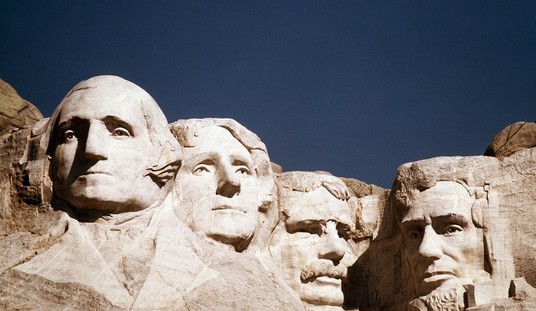Via Walter Russell Mead. If you’re not following this story yet, this’ll catch you up. Two levels of Obama strategic fog here. First, is the U.S. calling on China to drop the new ADIZ it declared over the disputed Senkaku/Diaoyu islands? And second, is the U.S. calling on American commercial airlines to follow China’s rules when inside the zone?
The answer to question number one is … maybe.
The explicit request for China to “rescind” threats against unannounced aircraft passing over a chain of islands in the East China sea was made by the US just hours after Biden landed in Tokyo ahead of a six-day trip to Japan, China and South Korea.
“The fact that China’s announcement has caused confusion and increased the risk of accidents only further underscores the validity of concerns and the need for China to rescind the procedures,” said Jen Psaki, the chief spokesperson for the State Department.
Ah, so we are demanding that they rescind the zone. A bold, risky move by O given that that’s bound to increase tension with China, but it’ll reassure Japan that we’re firmly on their side. But wait:
Vice President Joseph R. Biden Jr. delivered a carefully calibrated show of support for Japan on Tuesday, expressing deep concerns about China’s move to control airspace over disputed islands in the East China Sea, but stopping short of a demand that Beijing reverse itself…
[W]ith China unlikely to rescind a move so laden with nationalistic overtones, the vice president’s focus appeared to be less on rolling back the defense zone than on neutralizing its impact by persuading the Chinese authorities to stop scrambling fighter jets or otherwise disrupting the busy air corridors between Japan and China.
So we’re … not demanding that they rescind the zone, exactly, we’re just asking them not to enforce it by sending up warplanes to “escort” visitors, which amounts to nearly the same thing. The Chinese government gets to keep the zone formally in place, satisfying the nationalists at home, and the rest of the region gets to continue to fly over the islands unhindered. That’s one way to de-escalate — China, in fact, now says that the new zone “will not affect the freedom of overflight” — but Japan might worry that even a pro forma American concession to Chinese expansionism sets a worrisome precedent.
But wait (again). There’s more to the zone than jets being scrambled. China wants aircraft flying over the islands to radio Chinese authorities with identifying information about the flight. Complying with that rule would also be a nod towards Chinese dominion over the islands, which is why Japan told its own commercial airlines to ignore ite. That’s risky too in that it increases the chance of a fatal miscommunication with Chinese warplanes in the area, but that’s the price Japan is willing to pay to assert itself. How about the U.S., though? The Pentagon’s already sent two B-52s through the zone unannounced, just so that China understands we don’t accept their claim to the airspace. Does the White House also want American commercial airlines to follow Japan’s lead and defy China, or does it prefer the “better safe than sorry” approach? The answer:
Even as China scrambled fighter jets to enforce its newly declared air defense zone, the Obama administration said on Friday that it was advising American commercial airlines to comply with China’s demands to be notified in advance of flights through the area…
The American decision drew criticism from some quarters. Stephen Yates, a former Asia adviser to Dick Cheney when he was vice president, said it was “a bad move” that would undercut allies in the region that take a different stance.
So that’s Obama’s compromise. U.S. military planes will defy China to show Japan we’re a loyal ally but U.S. commercial planes will bow to China, partly to let the government save face and partly to make sure that there are no incidents between the Chinese air force and defenseless American jumbo jets. Some Japanese analysts are unhappy about our de facto recognition of China’s claim to the airspace — “I was taken aback when I heard this” — but now that the FAA has spoken, American airlines are bound by its order. They must and will identify themselves to China while within the new ADIZ.
Or will they?
@StateDept screwed up giving US airlines guidance to share flt info w/#China on Air ID zone. Sr WH officials disavow. w/@VP in Asia
— Steve Clemons (@SCClemons) December 2, 2013
New guidance on FAA @StateDept and WH coordination on commercial airline guidance about #China Air ID Zone soon to be issued.
— Steve Clemons (@SCClemons) December 3, 2013
On confusion about guidance to commercial airlines, FAA was lead & following standard procedure, not making policy acc to Sr Admin Source
— Steve Clemons (@SCClemons) December 3, 2013
White House & @StateDept say they are on same page and fully coordinated on #China Air ID Zone challenge. Had issue w/#FAA but 'solved'
— Steve Clemons (@SCClemons) December 3, 2013
That makes it sound like the FAA is on the verge of reversing itself and declaring that commercial airliners need not comply with China’s rules, but I don’t see anything on the wires about it yet. And so the mystery deepens: Is all of the ambiguity the product of incompetence and miscommunication, i.e. “Smart Power” in action, or is this a case of O dithering and changing his mind as he comes under pressure from Japan and China in reaction to each other? Stay tuned.







Join the conversation as a VIP Member